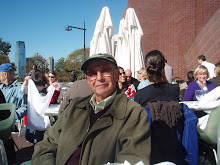Clark Hoyt is the Public Editor of the New York Times, sort of a peeping-over-the-shoulder-Tom on behalf of you and me, the readers. This past Sunday he looked into the case of Zachery Kouwe, a Times business reporter who resigned after he was accused of plagiarizing from the Wall Street Journal.
What's worse, the inquiry showed he had lifted copy from other news sources. And who were those news other sources? Why on-line sources. Who in his right mind believes anything you read on-line. Most of it, in my humble opinion is rumor, opinion and unsubstantiated.
This is what "journalism" has come to: in trying to be the first with anything, or at least not the last, once responsible news organizations chase after every item that may, emphasize may, be really newsworthy. Unfortunaltely, again in my opinion, most of it is garbage.
What bothers me most, however, is the New York Times attitude toward all this stuff. As a former journalist, (25 years with newspapers, UPI and CBS) and then as a consultant to business and professional people in how to deal with the media, the Times' attitude toward correcting examples of plagiarisim is abhorrent.
They may print a correction. Does anyone read corrections? I doubt it. What's worse, when Mr. Hoyt asked Philip Corbett, the paper's standards editor, if Kouwe's plagiarized material would be appended in their archives, Mr.Corbett, according to Mr. Hoyt, responded "the paper was not inclined to flag them, partly because there were some clear-cut cases and others that were less clear."
This is a total abrogation of responsibility in my view. When counseling business and professional people, one of the cardinal rules I stressed was that if there were errors in the stories that resulted from their interview, the errors should be corrected not only in the closest edition of the paper but also in the archives.
It doesn't take a genious to realize that some future researcher, calling up an article containing errors of plagiraized material, will assume that what he or she is reading is accurate and original reports when, in fact, it not only may be incorrect but also plagiarized material as well.
Sadly, this is not the New York Times I grew up with. I pass on to all of you the caution I gave to my oldest grandson when he graduated college: "Question everything."
We need to remember that.
Monday, March 8, 2010
Subscribe to:
Post Comments (Atom)


No comments:
Post a Comment